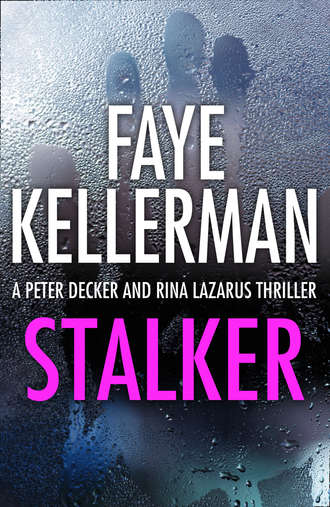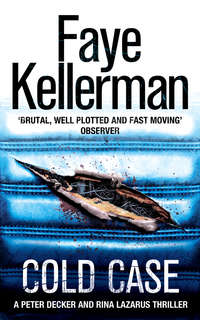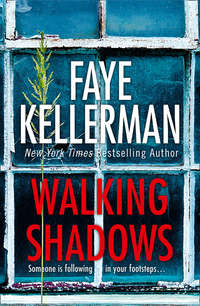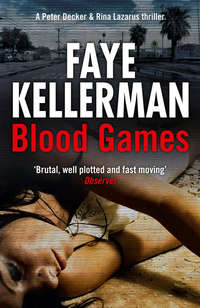
Полная версия
Stalker
Marge added, “Stacy also said the perp sounded American. Some of our women with kids said the perp sounded foreign.”
“But Stacy didn’t see him.”
“No.” Marge regarded Decker—her former partner who was now her superior. Instead of being excited about the information, he looked stressed by it. “Crayton’s an open case. I think we should root through the case files again and see if Stacy Mills or Elizabeth Tarkum fit in somewhere.”
Decker sat back in his chair. “Let’s do this. Compile a list of Crayton’s former friends and associates, then go check out if any of them have been threatened or robbed or received any strange phone calls … or been shot at.”
The room fell silent. Oliver tried to hide his apprehension. But Decker wasn’t paying attention to him. He looked up at the ceiling. “This means I’ve got to talk to my daughter.”
Marge widened her eyes. “Cindy? Whatever for?”
“She knew Crayton,” he said.
In a heartbeat, Oliver felt enormous relief. But he played along with it and acted confused. “What? How?”
“They used to go to the same gym,” Decker admitted. “They struck up a casual friendship.”
“A casual friendship?” Marge repeated.
“That’s her version.” Decker was pained. “What she told me was this. One day they walked out to the gym’s parking lot together. Someone took potshots at them—”
“Jesus!” Oliver emoted. “When was this?”
Decker made a face. “Around a year-plus ago. Just before Crayton was murdered.”
“And you’re just telling us now?” Oliver tried to add outrage in his tone of voice.
“That’s correct.” Decker’s face was flat. “I’m just telling you now. She didn’t tell me until after Crayton was whacked. When she finally did fess up, I questioned her extensively. She claims she didn’t see the shooter, and had no suspicion as to who might have done it. It didn’t appear like she was holding back, so I took it for the obvious. That Crayton was the intended target and she was in the wrong place at the wrong time.”
“She must have been petrified,” Marge said. “Poor thing.”
“I’m sure at the time, she was very shaken.” Decker took out a cigarette and played with it, rolling it between his fingers. “When she told me, she seemed to be handling it well.”
His office fell quiet.
Decker bit the ends of his mustache. “I told her to keep her mouth shut. I also told her to call me immediately if anything remotely threatening pops up. So far, she hasn’t said anything to me, but Cindy keeps her private life … well, private.”
Oliver shook his leg. “She needs to be told what’s going on for her own protection. Also, we’ve got to talk to her to make sure she’s leveled with you.”
“I’ll talk to her,” Decker said.
Oliver said, “Let Marge and me interview her. We can be objective. You can’t. Plus, she’ll talk more openly to us—”
“I don’t know about that.”
Marge said, “Pete, she might be embarrassed to tell you if she had a thing with this guy.”
Decker winced. “I don’t know if she was having an affair with him.”
“So let Marge and me find out.” Oliver attempted to be helpful. “Look, I’ll call her, okay? She’s in Hollywood, right?” He spoke glibly. “I had wanted to go over the Tarkum case with Rolf Osmondson anyway. Him and this other Dee named Craig Barrows, who had mentioned to some of the guys that Tarkum had some similarities to Crayton—”
“What kind of similarities?” Decker asked.
“Offhand, I don’t know. As long as I’m out there, I’ll set up an interview with Cindy.”
Decker didn’t say anything. Oliver took his silence for approval. “I’m not busy tonight. Let’s get this over with for Deck’s peace of mind.” He looked at Marge. “How about you?”
“I’ll have to make a couple of phone calls … rearrange some appointments.”
Oliver said, “She should be interviewed pronto. If you can’t do it, I’ll do it myself.”
Decker’s eyes slowly shifted from his desktop to Oliver’s face. Scott was smart enough to catch the implication. He didn’t jump. Instead he shrugged. “Hey, you can come with us, boss, but it might inhibit her.”
“What makes you think she’ll talk to you?”
Oliver was frustrated. He really did want to warn Cindy. And he wanted to talk to her alone. But that had to do with personal reasons. He said, “I think I could get something out of her. But if you have doubts, I’ll wait for Margie. She’s your daughter. You call the shots.”
Decker looked at Marge. “Rearrange your schedule.”
“It shouldn’t be a problem,” Marge said.
“Great!” Oliver feigned enthusiasm although he was a tad disappointed that Marge now had to play tagalong. Deep down, he knew it was best. He said, “Around eight, Margie?”
“Actually that would work out perfectly,” Marge answered. “Where does she live?”
“Near Culver City,” Decker said.
Oliver said, “I was planning to go into Hollywood at around six. I’ll meet you at Cindy’s around eight.” He looked pointedly at Decker. “Is that okay with you?”
Reluctantly, Decker agreed. Although he hated losing control, he knew Scott was right. He couldn’t be objective. He glanced at his watch. “I’ll call her … explain the situation and let her know you two are coming by at eight. In the meantime, you two reacquaint yourselves with the Crayton file. Divide up the search and interview as you see fit. Also, you should ask Korman if there’s been a proliferation of other luxury red car thefts.”
Oliver stood. “Sounds like a plan.”
“One more thing.” Decker got up and opened his door. “In Stacy Mills’s case, the perp ordered her to hit the ground. Now, he could have picked out the phrase from the movies or from those real-life cop shows, but you might want to consider that the guy has had some training somewhere.”
“Perp’s a cop?”
“A cop, a former cop, someone rejected from the academy, someone kicked out of the force, HPD, sheriff’s department, a security guard, a former security guard, ATF, the military—anyone who wears a uniform and has power needs.”
Cindy shifted the receiver over to her other ear. “My father was very vague. How’d this all come out?”
“Your dad brought it up because of a recent case—”
“What?” she screamed. “I can’t hear you.”
“Your dad brought it up!”
“My dad! Why? What were you guys talking about?”
“Cindy, I can barely hear you.” He was at a pay phone about a block away from the stationhouse. Traffic on the boulevard was fierce and loud. Oliver looked around. Not a soul to be seen. And even if someone were, what would he see? “I’ll explain when I see you.”
“How can you explain things with Marge there?”
Oliver said, “Look … your dad said we’d be there around eight, right?”
“Right.”
“Marge and I aren’t traveling over the hill together. So I’ll be there like we planned. Around seven-thirty.”
“Make it seven. I’ve got a lot of questions for you.”
Oliver hesitated, then said, “Seven-thirty, Cindy. I’ll be there at seven-thirty.”
There was silence over the line.
Coolly, Cindy said, “Okay, seven-thirty.”
Oliver said, “I have the feeling your dad’s going to show up unexpectedly. He doesn’t like delegating when it comes to his family. You’re his daughter, he’s got a personal interest in all this.” He waited a beat. “I know he’s going to show up at your doorstep with some excuse. I feel it like I feel the wind. Now I can explain being there twenty minutes, even a half hour early … traffic was light, I got done with Hollywood early, blah, blah, blah. But I can’t explain away snowing up an hour early. That would mean that I have plans.”
“What plans are those, Scott?”
“Now you’re being a wise guy.”
Cindy said, “Okay. Seven-thirty it is. Doesn’t matter to me.”
“Good. I’ll see you later.” Oliver smiled as he hung up the phone. Her words said it didn’t matter. But her voice said it did.
Webster raked his fingers through caramel-colored hair. He sat slouched over his desktop, a gray tweed jacket hanging over the back of his chair. He had just turned thirty-five, and his wife had mentioned something about a party. As far as Webster was concerned, he didn’t want to think about birthdays. Age was a mindset and, since he still looked young, he might as well feel young, too, although life in the big city sure moved faster than it did in Tupelo. He wondered if L.A.’s frenetic pace aged the body by pumping it full of adrenaline.
He sifted through the Crayton folders: both of them hefty, containing lots of dog-eared, multicolored pages. There were sections for the autopsy report: graphic photos of a savaged body with exposed bones that had been charred brittle black. There were a dozen black-and-white crash scene photos along with an itemization of what had been found in the burned-out Rolls. Then there was the personal material on Crayton, several sheets depicting a con man with all the rackets, angles, and scams. The files also contained legal documents stemming from lawsuits of several disgruntled individuals, along with a class action suit that had later been dropped.
Armand had had his fair share of enemies.
Webster looked up from the papers, his baby blues focusing on Marge’s face. “Sit. I’m straining my neck.”
“Sorry.” She pulled up a chair.
Webster said, “Bert and I interviewed the prime suspects. Three or four looked promising … the ones most likely to carry a grudge.” He handed her a list. “We came up empty.”
Marge eased herself back in the chair as she scanned the list. “What did you find?”
“They all had their excuses. Bert and I kept feeling that we were missing something or that someone was holding back. Namely the widow. She kept telling us that it was okay … that we were doing our best. Talking like we were schoolkids taking a hard test. Her attitude surprised us. Then I began to reckon that there was this real possibility that she didn’t want us to look too hard.”
“Why?”
“She was scared of someone coming back to get her.”
“Did she mention feeling threatened?”
“Matter of fact, she downplayed it, saying that the kidnapping was a random thing because Armand drove a very noticeable and expensive car. It could have happened to anyone. It was always Bert’s and my contention that she wanted the minimum—just to make it look good for Armand’s mother. While I feel very bad for this Stacy Mills, I am happy that she breathed some life into the Crayton case.”
Marge said, “So you never interviewed either Stacy Mills or Elizabeth Tarkum?”
“No. But I’m sure Armand kept secrets that he took to his grave. With Mills and Tarkum and the wife, you have a distinct advantage over Crayton, Margie. The girls are still alive.”
“Who’d you go with first?” Marge asked. “The wife?”
Webster nodded. “Definitely the wife. And if you find out something that I missed, don’t rub it in.”

Armand Crayton had lived in a posh development in the far west portion of the San Fernando Valley. Thirty homes were sprawled over half-acre lots, built around artificial lakes and lagoons, and an emerald-green golf course that rose and dipped like a gentle tide. A resident health club, spa, and two tennis courts were situated in the back, near the foothills, but Oliver and Marge never got that far. Crayton’s manse was located in the front section. To get through the gated entrance, Marge rang in through an intercom and announced herself. No response, but a moment later the wrought-iron barrier opened.
It made Marge wonder about how the kidnappers got in or out. She asked Oliver about it.
“Bert had a couple of theories,” he answered. “The kidnappers got hold of a magnetic card key, or maybe they rang one of the residences at random, said they had a delivery, and a naive soul opened the gate. Which would have been a stupid move because all regular delivery people had pass cards. FedEx, UPS, the mail carrier, the local laundry, the gourmet market, mobile pet groomer, et cetera, et cetera.”
“Which means there are lots of cards in circulation.”
“Yep, they’re very easy to come by,” Oliver answered. “By the way, the ‘ring the house and open the gate’ theory wasn’t borne out by any of the resident interviews. No one admitted to letting them in.”
“An inside job?”
“Probably, but that doesn’t mean the wife did it. As far as getting out, the arm lifts automatically. Still, it’s not a slam dunk for a kidnapper.”
Marge agreed. She parked the car, got out, and stretched, looking at the quiet estate that had once been a crime scene. Mediterranean in style, the house was two-storied—as were all the homes in the neighborhood—and square, accented with cornerstones, windowed balconies, and a roof composed of overlapping red, pseudo-Spanish tiles. It was faced with light, apricot-colored stucco and sat behind a screen of palms, banana plants, and tree ferns. But the place showed signs of neglect. The lawn was a bit overgrown, there were weeds in the planting area, and light gray smudges streaked down the plaster from the window corners, giving the impression that the house had been crying. The entrance door was recessed under an arched portico. Marge rang the bell. A young woman in her twenties answered the door.
“Mrs. Crayton?” Marge asked.
“Call me Lark,” the woman answered. “Mrs. Crayton is my former mother-in-law. You’re the police?”
“Detective Oliver,” Scott said. “This is Detective Dunn. Thank you for agreeing to see us.”
“Yeah, sure.” Lark opened the door all the way. “Come in.”
As Oliver crossed the threshold, he wondered why the hell Tom and Bert hadn’t mentioned the widow’s comeliness. Tall and slender, with lots of chest filling out a bright, white T-shirt. Legs that didn’t quit even if they were hidden under jeans. Her face was all acute angles—a sharp jawline, a strong chin, and pronounced cheekbones. Ash-blond hair had been tied back into a ponytail, gray eyes were outlined in black liner. Naturally lush lips—killer lips.
She brought them through a two-story entry hall and into the living room/family room/den. It was hard to tell what official function the room served because the floor plan was so open. Beige walls surrounded oversized tan and ivory furniture. The floor was covered by plush ecru carpet. Potted plants added some life to the colorless decor, as did the undraped windows outlining views of the requisite backyard aqua-jeweled pool. She pointed to a sofa, then took a seat on one of the room’s enormous chair-and-a-halves—the latest in chichi accoutrements.
Lark draped her legs over the chair’s arm.
Seductive, Oliver thought. The way she was looking at him gave him goose bumps. That pose had probably served her well in the past. When she spoke, she gazed directly into his eyes. “Did you find out anything new?”
Oliver said, “Nothing earth-shattering, but we’re still—”
“Yeah, yeah.” Lark broke the stare and lapsed into ennui, picking up a cigarette case from the side table and pushing a button. The lid popped open. She pulled out a smoke and spoke to Marge. “Throw me that lighter, will you?”
Конец ознакомительного фрагмента.
Текст предоставлен ООО «ЛитРес».
Прочитайте эту книгу целиком, купив полную легальную версию на ЛитРес.
Безопасно оплатить книгу можно банковской картой Visa, MasterCard, Maestro, со счета мобильного телефона, с платежного терминала, в салоне МТС или Связной, через PayPal, WebMoney, Яндекс.Деньги, QIWI Кошелек, бонусными картами или другим удобным Вам способом.









